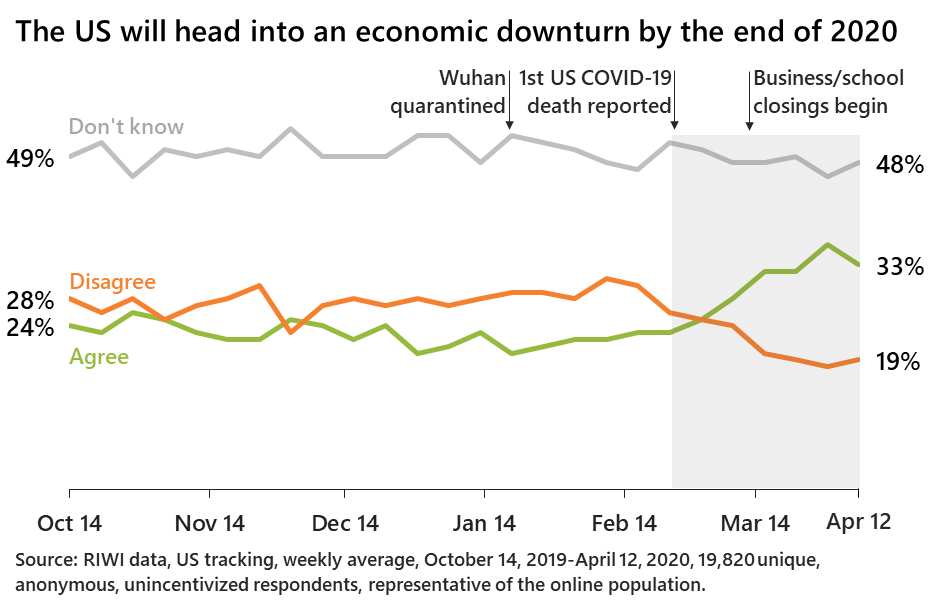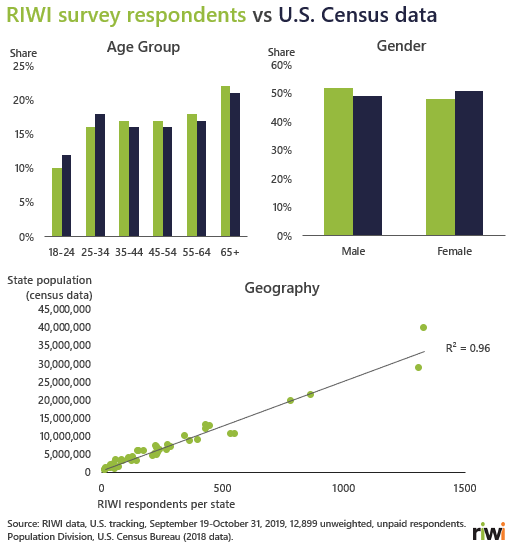By Danielle Goldfarb and Emily Kuzan
Data are current as of April 12, 2020 at 23:59 Eastern Daylight Time (EDT).

Could a strong, self-reinforcing narrative of fear among the US population about its economic prospects lead to an ever deeper, more widespread, and more long-lasting recession?
Everyone agrees that there will be significant economic fallout in the US and globally as a result of the COVID-19 pandemic. But could a pandemic of fear induce a more prolonged and severe recession unnecessarily, as Nobel-prize winning economist Robert Shiller warns1? Shiller points out that the psychological impacts including worries about economic prospects can turn into a self-fulfilling prophecy, worsening the economic impact.
At RIWI, we’ve been continuously surveilling the psychological reaction of the broadest set of Americans on a range of questions since October 2019. On a daily, 24/7 basis, we are asking Americans whether they expect a recession in 2020. We have heard from almost 20,000 unique respondents as of 23:59 EDT, April 12, 2020, approximately 700 respondents per week.
These include both those who are typically more engaged as well as more typically disengaged Americans that don’t tend to answer surveys or are not active on social media. Of the 20,000 RIWI respondents that answered this question, 7 in 10 have not answered a survey in the past month, and more than half of those report they have never answered a survey before.
Our resulting crowd predictions show a sharp increase in recession predictions since the first American COVID-19 death was reported, steadily increasing in the days since physical distancing began. This provides a proxy on the degree to which Americans’ fears of a recession are worsening. We will continue to track this narrative with a new random sample of Americans every day to determine if this continues or stabilizes.
Will the share that expects a recession continue to increase? How deep and prolonged do people think a recession would be? We are surveilling a range of economic and financial behaviors and beliefs in the US and globally. We welcome your suggestions for the psychological impacts we should track on a daily basis in the coming weeks and months to help forecast America’s true economic trajectory and inform both businesses and policymakers.
Note 1: We conducted A/B testing for different terms.
At the outset of this project we conducted a randomized control trial to ensure we were gathering reliable data. We randomly exposed respondents to a question with “economic downturn” versus one with the term “recession”. The results were the same regardless of the term to which respondents were exposed.
Note 2: RIWI data include “quiet voices” in order to more reliably probe the truth.
During a pandemic, hearing from the broadest set of voices possible is vital in order to obtain the full picture of people’s situations and beliefs on their and their country’s economic trajectory. RIWI collects data using machine-learning technology that randomly engages respondents from the Web-using population. As a result of this approach, the RIWI data are broad-based, come from across all regions (rural and urban), and draw daily from non-habitual survey respondents2. RIWI engages respondents anonymously, continuously, randomly and does not collect any personally identifiable information.
In this study, RIWI’s unweighted survey data nearly match U.S. census data when comparing age, gender, and geographic distribution.

During a pandemic, traditional data collection methods face heightened challenges:
- In-person interviews and focus groups are not possible during physical distancing.
- Email access panels suffer as people are overloaded with email registering as spam and phish attempts.
- The information explosion of loud voices on social media makes social media analytics full of greater noise and “echoes,” and may therefore provide an unreliable signal.
RIWI technology addresses many of the data collection challenges that are heightened during the COVID-19 pandemic:
- RIWI draws randomly from the entire Web-using population in each country, so as more people go online, RIWI’s reach broadens.
- RIWI data collection is continuous, making it possible to pinpoint inflection points no matter when they happen in a particular month.
- Data collection is 24/7, avoiding time-of-day bias as compared to other methods.
- Respondents reflect both engaged and typically disengaged populations, in contrast to typical polls which tend to capture engaged, often paid, populations.
- Data are collected anonymously, reducing social desirability bias.
- Respondents receive no money or rewards-in-kind for participating, ensuring data quality, anonymity and compliance with privacy laws.
RIWI is actively surveilling various aspects of the COVID-19 pandemic in multiple countries among a continuous random sample of the Web-using population. This includes tracking the trajectory of self-reported illness and testing, trust in public officials and compliance with public health directives, and the psychological, financial, and consumer impacts.
Related research:
Hearing from all voices during COVID-19
Are enough of us doing the right thing? Physical distancing during COVID-19
Virtual lecture: How is the public responding to COVID-19?
Chinese vs. American Confidence in COVID-19 Response Measures
- https://www.cnbc.com/2020/04/11/robert-shiller-pandemic-of-fear-could-tip-economy-into-a-depression.html
- The scientific reasons for the superior data quality of multi-country RIWI survey collection in all countries were summarized by Roder-DeWan S et. al (of the Harvard T.H. Chan School of Public Health), in a 2019 paper studying expectations of healthcare quality expressed by 18,000 people in 12 countries, noting “[RIWI] has important advantages over other internet surveying methods such as internet panels and email-based sampling.” (Roder-DeWan S, et al. (2019) Expectations of healthcare quality: A cross-sectional study of internet users in 12 low- and middle-income countries. PLoS Med 16(8); see also, Neil Seeman, “Use Data to Challenge Mental Health Stigma” (Nature 528, 309).